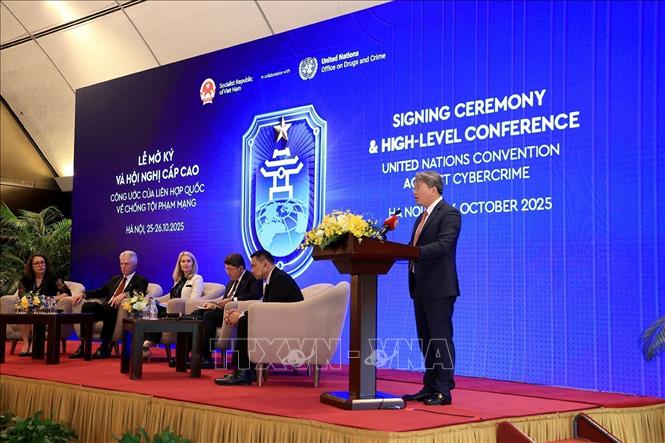
The discussion session was attended by speakers including Minister of Justice Nguyen Hai Ninh, Turkish Minister of Justice Yılmaz Tunc, Head of UNODC's Global Cybercrime Programme Bertha Nayelly Loya Marin, and several speakers from various countries attending the Hanoi Convention's opening ceremony.
Speaking at the discussion session, Minister of Justice Nguyen Hai Ninh emphasized: Twenty-five years after the adoption of the United Nations Convention against Transnational Organized Crime (Palermo Convention) in Italy in 2000 – the first global legal instrument on combating transnational crime – the world has witnessed the birth of another global convention in this field: the Hanoi Convention. The journey from the Palermo Convention to the Hanoi Convention is not merely a symbolic succession, but also reflects the persistent and responsible efforts of the international community in promoting multilateral cooperation, harmonizing laws, and building flexible response mechanisms to the increasingly complex cross-border legal challenges of the 21st century.
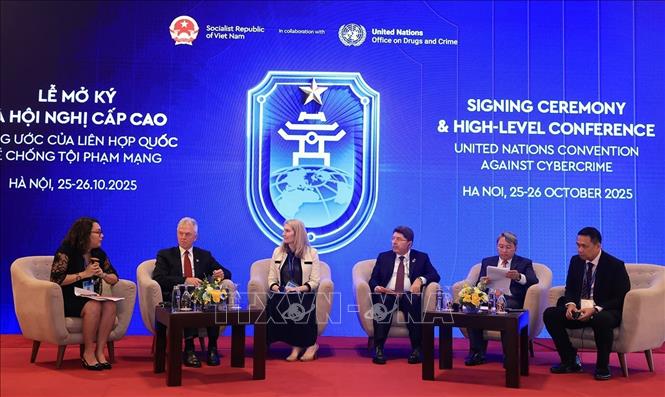
According to the Minister, humanity is living in the era of the Fourth Industrial Revolution, with groundbreaking technologies such as artificial intelligence (AI), big data, blockchain, and the Internet of Things (IoT). Data has become a strategic resource, bringing immense economic and social value, opening a new era of development where every individual can connect, learn, and create without borders. However, alongside technological achievements is the rapid increase in global cybercrime with increasingly sophisticated methods, causing damage not only economically but also directly threatening national security, human rights, and civil rights. In this context, the opening ceremony of the Hanoi Convention is of particular importance, serving as a forum for the international community to demonstrate commitment and unified action in the fight against cross-border cybercrime.
Stemming from that spirit of cooperation and recognizing the aforementioned challenges, Vietnam believes that the core values of digital transformation and technology must be built on the foundation of ensuring human rights and civil rights in the digital environment.
To realize this vision, the Minister proposed several key solutions, such as focusing on perfecting the legal framework for protecting human rights and civil rights in the digital environment, based on international human rights treaties; ensuring harmony between national and international law, linking the principles of international law with the specific conditions of each country; ensuring that human rights and civil rights are linked to protecting national and ethnic interests; and protecting citizens in cyberspace is not only the core role of the state but also the responsibility of each individual, enterprise, organization, and the entire society.
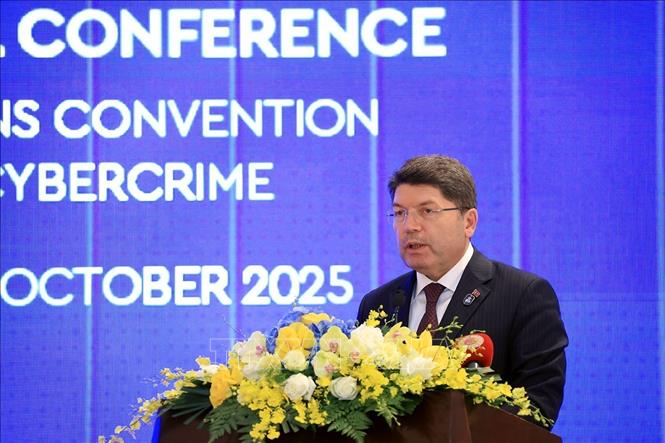
Regarding the protection of citizens in cyberspace, Turkish Justice Minister Yılmaz Tunc stated that the country passed the Internet Law in 2001 and numerous other legal documents to protect citizens from false and harmful information. In the context of today's rapidly developing technology, Turkey is researching, reviewing, amending, and enacting new legal documents to adapt and better protect its citizens from the negative aspects of the internet.
Turkish Justice Minister Yılmaz Tunc stated that, thanks to the increased application of high technology, the country's judicial system has been integrated, connecting data between agencies, facilitating citizens in submitting applications and accessing information online. Currently, Turkey has launched an online portal for lawyers and citizens with over 25 million users, allowing them to track case files online and carry out enforcement without limitations of space, time, or location.
The online trial system via video conferencing leverages the principle of direct dialogue. Since 2020, the country has implemented online hearings, demonstrating the important role technology plays in supporting the judicial process. Türkiye is ready to share its experience in this area with other countries.
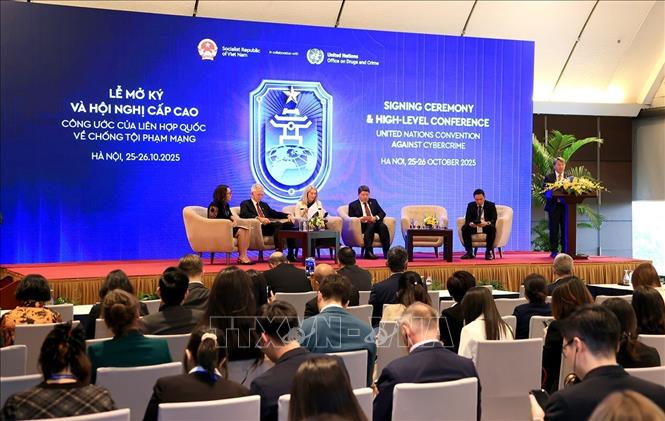
Australian Ambassador Jessica Hunter shared that, to protect citizens in the era of digital transformation, Australia focuses on three key areas: raising public awareness of online safety; issuing toolkits and manuals to help citizens identify and respond to violations; and ensuring a complaint and grievance mechanism so that citizens can report violations of their rights in cyberspace.
Source: https://baotintuc.vn/thoi-su/cong-uoc-ha-noi-bao-ve-quyen-con-nguoi-quyen-cong-dan-tren-moi-truong-so-20251025211643552.htm






![[Photo] Closing Ceremony of the 10th Session of the 15th National Assembly](/_next/image?url=https%3A%2F%2Fvphoto.vietnam.vn%2Fthumb%2F1200x675%2Fvietnam%2Fresource%2FIMAGE%2F2025%2F12%2F11%2F1765448959967_image-1437-jpg.webp&w=3840&q=75)
![[Photo] Prime Minister Pham Minh Chinh holds a phone call with the CEO of Russia's Rosatom Corporation.](/_next/image?url=https%3A%2F%2Fvphoto.vietnam.vn%2Fthumb%2F1200x675%2Fvietnam%2Fresource%2FIMAGE%2F2025%2F12%2F11%2F1765464552365_dsc-5295-jpg.webp&w=3840&q=75)


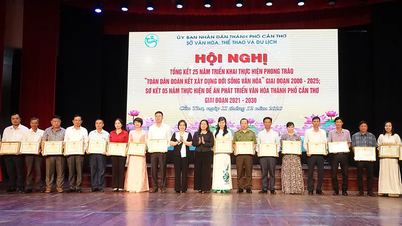

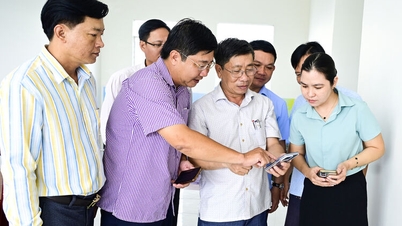






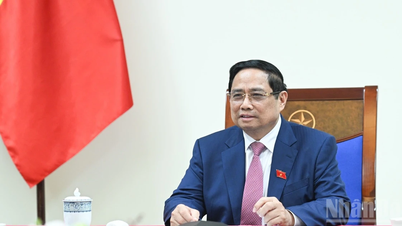



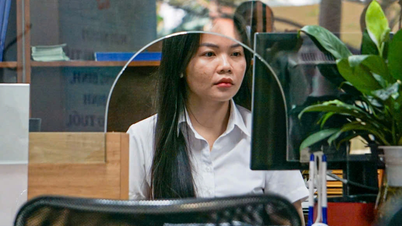











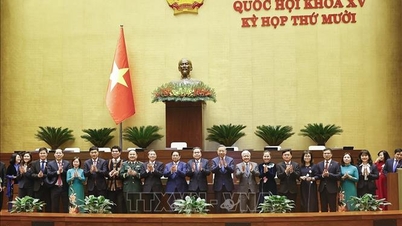

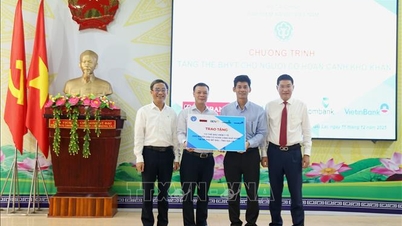






















![[OFFICIAL] MISA GROUP ANNOUNCES ITS PIONEERING BRAND POSITIONING IN BUILDING AGENTIC AI FOR BUSINESSES, HOUSEHOLDS, AND THE GOVERNMENT](https://vphoto.vietnam.vn/thumb/402x226/vietnam/resource/IMAGE/2025/12/11/1765444754256_agentic-ai_postfb-scaled.png)

























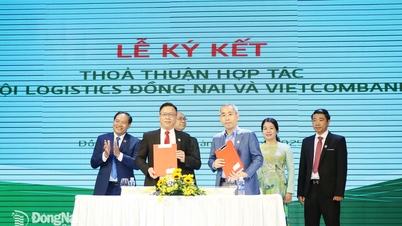






















Comment (0)